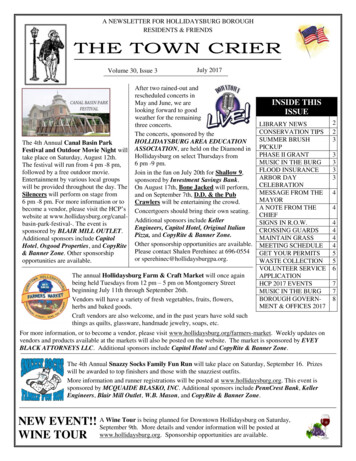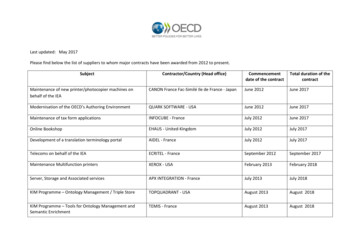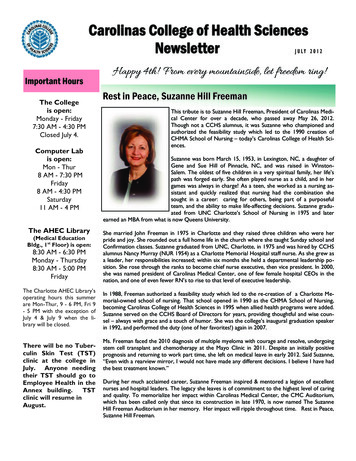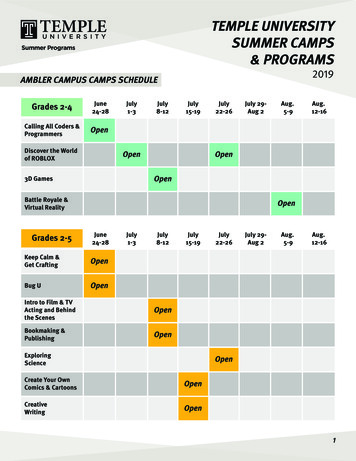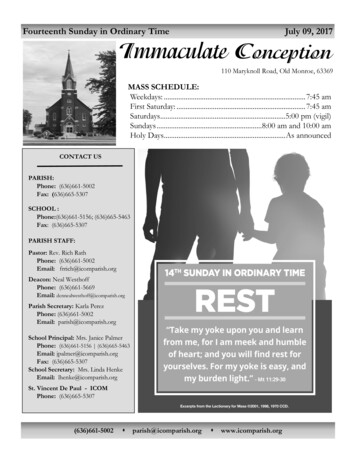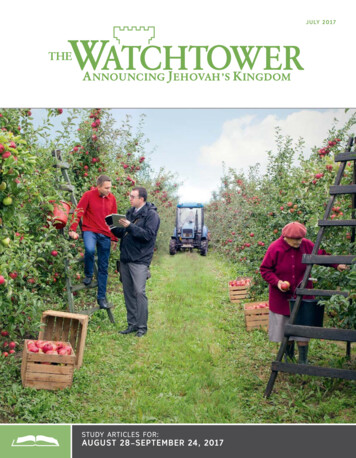
Transcription
JULY 2 0 1 734567STUDY ARTICLES FOR:AUGUST 28 –SEPTEMBER 24, 2017
COVER IMAGE:PUBLISHERSPOLAND119,932In an apple orchard in Grójec, a publisher sharesthe Bible’s message with one of the workersBIBLE STUDIES50,479MEMORIAL ATTENDANCE( 2016)190,613TABLE OF CONTENTS317THEY OFFEREDTHEMSELVES WILLINGLY—In TurkeyPsalm 147 repeatedly encourages God’s peopleto praise Jehovah. What was it about Jehovah thatimpressed the psalmist so much that he wanted Godto be praised? This article explains, and it shows whywe should have a like desire to praise our God.7WEEK OF AUGUST 28–SEPTEMBER 3Seeking Riches That Are TrueThis article examines how we can use our materialpossessions to “make friends” in heaven. (Luke 16:9)It also discusses how we can avoid becomingenslaved to the greedy commercial world and howwe can serve Jehovah as fully as possible.22WEEK OF SEPTEMBER 4-10“Weep With Those Who Weep”How can a Christian deal with the shock oflosing a loved one in death? Jehovah providesmuch-needed consolation by means of Jesus Christ,the Scriptures, and the Christian congregation.This article will show us how to gain comfort, bothfor ourselves and for others who are grieving.27To make a donation,please visit www.jw.org.34567 Unless otherwiseindicated, Scripturequotations are fromthe modern-languageNew World Translationof the Holy Scriptures.Winning the Battle for Your Mind31This publication is notfor sale. It is providedas part of a worldwideBible educational worksupported by voluntarydonations.WEEK OF SEPTEMBER 18-24“May He . . . Give Successto All Your Plans”Many young brothers and sisters are zealouslyentering the full-time service. Is that your desire?This article provides sound advice from theScriptures that will help you to plan a happyand successful future.12WEEK OF SEPTEMBER 11-17“Praise Jah!”—Why?QUESTIONS FROM READERSJuly 2017Vol. 138, No. 11 ENGLISHThe Watchtower (ISSN 0043-1087) Issue 11 July 2017 is published monthly with an additionalissue published in January, March, May, July, September, and November by Watchtower Bibleand Tract Society of New York, Inc.; L. Weaver, Jr., President; G. F. Simonis, SecretaryTreasurer; 1000 Red Mills Road, Wallkill, NY 12589-3299, and by Watch Tower Bible and TractSociety of Canada, PO Box 4100, Georgetown, ON L7G 4Y4. Periodicals Postage Paid at Brooklyn, NY, and at additional mailing offices. POSTMASTER: Send address changes to Watchtower,1000 Red Mills Road, Wallkill, NY 12589-3299. 5 2017 Watch Tower Bible and Tract Society ofPennsylvania. Printed in Canada.
TH EY OF F E R E DTH E M S E LVE SWI LLI NG LYin TurkeyFIRST-CENTURY Christians madegreat efforts to reach as manypeople as possible with the “good newsof the Kingdom.” (Matt. 24:14) Someeven traveled to foreign countries. Forexample, the apostle Paul went to theregion where modern-day Turkey issituated and preached there extensivelyduring his missionary journeys.1 Some2,000 years later, in 2014, Turkeywas once again the focus of a specialpreaching campaign. Why was thecampaign organized? Who shared in it?1 See the brochure “See the Good Land,” pp. 32-33.Alisa“WHAT’S GOING ON?”There are over 2,800 publishers in Turkey, butthe country has a population of 79 million. Thismeans that the publisher-to-population ratio inTurkey is nearly 1 to 28,000. As you can imagine,the publishers have been able to contact only asmall number of the inhabitants of this country.The aim of the special preaching campaign wasto reach as many people as possible in a shorttime. About 550 Turkish-speaking brothers andsisters from other countries traveled to Turkey andpreached alongside the local publishers during thecampaign. What was achieved?A widespread witness was given. One congregation in Istanbul wrote: “When people saw us, theyasked: ‘Is there a special convention here? We seeJehovah’s Witnesses everywhere!’ ” A congregation in the city of Izmir wrote: “A man working at ataxi stand approached a local elder and asked,‘What’s going on? Have you increased your activity?’ ” Yes, the campaign was noticed.The foreign participants thoroughly enjoyed thepreaching work. Steffen, who is from Denmark,said: “Every day, I was able to preach to peoplewho had never heard about Jehovah. I felt that Iwas really making Jehovah’s name known.” JeanDavid from France wrote: “We preached on justone street for hours. It was wonderful! Most people didn’t know Jehovah’s Witnesses. At almostevery door, we were able to start a conversation,show one of our videos, and leave literature withthe householder.”3
1Atsuko2Stéphanie (center)3Rudy4Claire (center)5Sascha6Zeynep7Federico8Steffen324The 550 participants placed about 60,000 piecesof literature in just two weeks! The campaign didindeed result in a widespread witness.Zeal for the ministry increased. The special activity had a motivating effect on the local brothers.Many started thinking about full-time service. Infact, the number of regular pioneers in Turkey increased by 24 percent during the 12 months following the campaign.Participants from abroad expressed how the campaign affected their ministry even after they returned to their home countries. Şirin, a sister fromGermany, wrote: “The brothers in Turkey witnessinformally with great ease. I am very shy when itcomes to preaching informally. But thanks to thespecial campaign, the example of the local brothers, and many prayers, I was able to do what Icouldn’t do before. I even preached and placedtracts in the subway! Now I am not as shy as before.”41THE WATCHTOWER“I learned some lessons for my own ministry,” saidJohannes from Germany. “The brothers in Turkeyreally want to share the truth with as many peopleas possible. They give a witness at every opportunity. I decided to do the same when I returned toGermany. And now I really do preach to more people than before.”“This campaign affected my personal ministry alot. It helped me to be more courageous and totrust more in Jehovah,” commented Zeynep fromFrance.The publishers drew closer to one another. Thelove and unity among the brothers from differentcountries made a lasting impression. “We ‘tasted’ the brothers’ hospitality,” said Jean-David,mentioned earlier. He added: “They accepted usas their friends and as part of their family. Theyopened their homes to us. I knew that we are an international brotherhood; I had read it many timesin our literature. But this time, I experienced it firsthand. I felt even more proud of being one of Jeho-
5768vah’s people, and I thank him for this wonderfulprivilege.”when in 2015, six need-greaters from Germany andthe Netherlands moved in to support them!“Whether from Denmark, France, Germany, or Turkey, we were all one family. It was as if God hadrubbed out all the national borders with a big eraser,” said Claire from France.SERVING AT THE FRONT LINEWhat do need-greaters who have been in Turkey fora while say about their life there? Granted, at timesit is challenging, but life as a need-greater is veryrewarding. Consider what some have said:Stéphanie from France added: “The special campaign taught us that what unites us is not the culture or language but the love for Jehovah that wehave in common.”THERE HAVE BEENLONG-TERM BENEFITSMany of the foreign participants began to thinkabout moving to Turkey to help with the tremendous work still to be done there. Quite a fewhave already moved. These need-greaters are verymuch appreciated.“Not having many material possessions to be attached to helps me to feel free, and it allows me toconcentrate on the most important things,” saysFederico, a married brother in his early 40’s whomoved from Spain. Would he recommend this typeof service? “Yes, absolutely!” he says. “When youmove abroad with the purpose of helping people toget to know Jehovah, you are in reality puttingyourself in his hands. You really feel Jehovah’s caremore than ever.”Take, for example, a small isolated group of 25publishers in one area. For many years, there wasonly one elder. Imagine the joy of the publishers“It gives us tremendous satisfaction to serve at thefront line, so to speak, and to share the truth withso many people who have never heard about itJULY 20175
before,” says Rudy, a married brother in his late50’s from the Netherlands. “Seeing the happinessof people when they accept the truth is a greatsource of joy.”also my close Friend, whom I get to know better under different circumstances. My life is full of happy moments, exciting experiences, and generousblessings!”Sascha, a married brother in his early 40’s whomoved from Germany, says: “Every time I am inthe ministry, I meet people who are hearing thetruth for the very first time. Giving such ones theopportunity to get to know Jehovah gives me tremendous satisfaction.”“VIEW THE FIELDS”By means of the special preaching campaign inTurkey, the good news reached many more people. Yet, there is still a vast untouched territory. Every day, need-greaters who moved to Turkeymeet people who have never heard about Jehovah.Would you like to serve in such a territory? If so,we encourage you: “Lift up your eyes and view thefields, that they are white for harvesting.” (John 4:35) Could you assist in a part of the world wherethe fields are “white for harvesting”? If so, begintaking practical steps now toward reaching thatgoal. One thing is sure: Having an increased sharein spreading the good news “to the most distantpart of the earth” will bring you rich blessings beyond compare!—Acts 1:8.Atsuko, a married sister in her mid-30’s from Japan, states: “In the past, I always wanted Armageddon to come immediately. But after having movedto Turkey, I thank Jehovah that he is still showingpatience. The more I see how Jehovah directs matters, the more I desire to draw closer to him.”Alisa, a sister in her early 30’s from Russia, comments: “Serving Jehovah in this kind of ministry has helped me to taste all his goodness.” (Ps.34:8) She adds: “Jehovah is not only my Father but9Jean-David (center)10Şirin11Johannes91011
Seeking RichesThat Are True“Make friends for yourselves by means of the unrighteousriches.”—LUKE 16:9.TODAY’S economic system is harsh and unfair. Young peoplesearch in vain for employment. Many risk their lives to moveto more prosperous lands. Poverty is widespread, even in affluent lands. And the gap between rich and poor is widening.According to recent estimates, the richest 1 percent of theearth’s population have as much wealth as the rest of its inhabitants combined. While such a figure is difficult to confirm, no one disputes that billions of people are desperatelypoor, while others have enough wealth to last for many lifetimes. Jesus recognized this harsh reality with the words:“You always have the poor with you.” (Mark 14:7) Why suchinequality?2 Jesus understood that the current economic systemwould not change until God’s Kingdom comes. Along with thepolitical and religious elements, the greedy commercial system, represented by “the merchants” of Revelation 18:3, constitutes part of Satan’s world. Unlike the complete separationthat God’s people maintain from politics and false religion,SONGS: 122, 129CAN YOU EXPLAIN?How can materialpossessions be used tostrengthen our friendshipwith God?How can we avoid becomingslaves of today’s commercialworld?Why are you determinedto seek spiritual riches?1, 2. In this system of things, why will there always be some poor people?7
most cannot separate themselves completely from the commercial part of Satan’s world.3 As Christians, we do well to examineour view of today’s commercial systemby asking ourselves such questions asthese: ‘How can I use my material possessions to show faithfulness to God?How can I minimize involvement withthe commercial world? What experiences show that God’s people fully trust inhim in this challenging environment?’THE ILLUSTRATIONOF THE UNRIGHTEOUS STEWARDRead Luke 16:1-9. Jesus’ illustration of the unrighteous steward isthought-provoking. After being accusedof wastefulness, the steward acted with“practical wisdom” to “make friends” tohelp him when he lost his stewardship.1Jesus, of course, was not encouraginghis disciples to act in an unrighteous wayin order to survive in this world. He labeled such behavior as that of “the sonsof this system of things,” but he used theillustration to drive home a point.5 Jesus knew that like the steward whofound himself in a difficult situation,most of Jesus’ followers would need tomake a living in this unjust commercial world. So he urges them: “Makefriends for yourselves by means of theunrighteous riches, so that when suchfail, they [Jehovah and Jesus] may re41 Jesus does not indicate whether the accusationwas valid. The Greek word rendered “accused” atLuke 16:1 allows for the idea that the steward wasslandered. Jesus, though, focuses on the steward’sreaction, not on the reasons for the dismissal.3. What questions will we consider?4, 5. (a) In what situation did the steward ofJesus’ illustration find himself? (b) What admonition did Jesus give his followers?8THE WATCHTOWERceive you into the everlasting dwellingplaces.” What can we learn from Jesus’counsel?6 Although Jesus does not explain whyhe calls riches “unrighteous,” the Biblemakes clear that commercialism was notpart of God’s purpose. Jehovah provided abundantly for Adam and Eve’s needsin Eden. (Gen. 2:15, 16) Later, when holyspirit operated on the first-century congregation of anointed ones, “not evenone of them would say that any of thethings he possessed was his own, butthey had all things in common.” (Acts 4:32) The prophet Isaiah pointed to thetime when all humans would freely enjoyearth’s material resources. (Isa. 25:6-9;65:21, 22) But in the meantime, Jesus’ followers would need “practical wisdom” to make a living, using the “unrighteous riches” of today’s world whileseeking to please God.WISE USE OF UNRIGHTEOUS RICHES7 Read Luke 16:10-13. The steward inJesus’ illustration made friends for personal benefit. However, Jesus urged hisfollowers to make friends in heaven forunselfish purposes. The verses that follow the illustration connect the use of“unrighteous riches” with faithfulnessto God. Jesus’ point was that we can‘prove ourselves faithful’ with, or control, those riches once we obtain them.How so?8 An obvious way to prove ourselvesfaithful with our material things is bycontributing financially to the world-6. How do we know that today’s commercialsystem was not part of God’s purpose?7. What counsel is found at Luke 16:10-13?8, 9. Give examples of how some are showingfaithfulness in their use of unrighteous riches.
wide preaching work that Jesus foretoldwould take place. (Matt. 24:14) A younggirl in India kept a small money box andgradually added coins, even giving uptoys to do so. When the box was full, shehanded the money over to be used forthe preaching work. A brother in Indiawho has a coconut farm contributed alarge number of coconuts to the Malayalam remote translation office, reasoningthat since the office needs to buy coconuts, his supplying them directly willhelp his contribution to go further thanit would if he gave cash. That is practicalwisdom. Likewise, brothers in Greeceregularly contribute olive oil, cheese,and other foods for the Bethel family.9 A brother from Sri Lanka, now living abroad, has made his property backhome available for meetings and assemblies and for housing full-time servants.It is a financial sacrifice for the brotherbut a great help to the local publishers oflittle means. In a land where the work isrestricted, brothers make their homesavailable for use as local Kingdom Halls,allowing many pioneers and others withlimited funds to have a meeting placewithout a financial burden.10 The foregoing examples show howGod’s people are “faithful in what isleast,” that is, in their use of materialwealth, which is inferior to spiritual riches. (Luke 16:10) How do these friends of10. What are some blessings we receive whenwe give generously?Jehovah feel about making such sacrifices? They understand that being generous is a way to gain “true” riches. (Luke16:11) A sister who contributes regularlyto the Kingdom work tells of a blessingshe has received: “By being materiallygenerous, I have experienced an unusual phenomenon within myself over theyears. I find that the more generous I ammaterially, the more generous my disposition toward others has become. I ammore generous in being forgiving, in being patient with others, and in being ableto accept disappointments and counsel.” Many have learned that generosity is spiritually enriching.—Ps. 112:5;Prov. 22:9.11 Using material assets to advanceKingdom interests shows “practical wisdom” in another way. It allows us totake advantage of our circumstances tohelp others. Those who have this world’smeans but cannot share in the full-timeministry or move abroad have the satisfaction of knowing that their donatedfunds support the ministry of others.(Prov. 19:17) Voluntary contributionshelp to supply literature and support thepreaching work in territories where poverty abounds but where there is greatspiritual growth. For years, in such landsas Congo, Madagascar, and Rwanda,11. (a) How does our freely giving show “practical wisdom”? (b) What equalizing of financesis taking place among God’s people? (Seeopening picture.)HOW TO MAKE AN ONLINE DONATIONOur worldwide Bible educational work and humanitarianactivities are supported by voluntary donations. To donateonline, go to jw.org and click the “Make a Donation to OurWorldwide Work” link near the bottom of any page.
brothers often had to choose betweenhaving food for their families and havingcopies of the Bible, which sometimescost the equivalent of a weekly or amonthly wage. Now, by means of thecontributions of many and “an equalizing” of finances, Jehovah’s organizationhas sponsored the translation and distribution of Bibles to each member ofthe family as well as to spiritually hungryBible students. (Read 2 Corinthians 8:13-15.) Thus, Jehovah’s friendship is being freely extended to both the giversand the receivers.MINIMAL INVOLVEMENT IN “THECOMMERCIAL BUSINESSES OF LIFE”Another way to gain friendship withJehovah is by minimizing our involvement with the commercial world and using our circumstances to seek “true”riches. Abraham, a man of faith in ancient times, obediently left prosperousUr in order to live in tents and pursue hisfriendship with Jehovah. (Heb. 11:8-10)He always looked to God as the Sourceof true wealth, never seeking materialadvantages that would indicate a lack oftrust. (Gen. 14:22, 23) Jesus encouraged this sort of faith, telling a richyoung man: “If you want to be perfect,go sell your belongings and give to thepoor, and you will have treasure in heaven; and come be my follower.” (Matt. 19:21) That man lacked faith like that ofAbraham, but others have shown implicit trust in God.13 Timothy was a man of faith. Aftercalling Timothy “a fine soldier of Christ1212. How did Abraham show that he trusted inGod?13. (a) What admonition did Paul give to Timothy? (b) How can we apply Paul’s counsel today?10THE WATCHTOWERJesus,” Paul told him: “No man serving as a soldier involves himself in thecommercial businesses of life, in orderto gain the approval of the one whoenrolled him as a soldier.” (2 Tim. 2:3, 4) Jesus’ followers today, including anarmy of over one million full-time ministers, apply Paul’s counsel to the extentthat their circumstances allow. Resisting the pressures of advertising and theworld around them, they remember theprinciple: “The borrower is a slave tothe lender.” (Prov. 22:7) Satan wouldlike nothing better than to have us spendall our time and energy as slaves tohis commercial world. Some decisionscould keep us in financial bondage foryears. Huge home mortgages, lingeringstudent loans, expensive car payments,even extravagant weddings can resultin great financial pressure. We demonstrate practical wisdom when we simplify our life and reduce debt and expenses, setting ourselves free to slave for Godrather than for today’s commercial system.—1 Tim. 6:10.14 Keeping our life simple involves setting priorities. One couple owned athriving manufacturing business. However, their desire to reenter the fulltime ministry compelled them to sell thebusiness, their boat, and other materialitems. They then volunteered to helpwith the construction of world headquarters in Warwick, New York. A specialblessing for them has been to serve atBethel with their daughter and son-in-lawand, for some weeks, with the husband’sparents, who also worked on the Warwickproject. A pioneer sister in Colorado,U.S.A., found part-time employment at a14. What kind of determination is needed?Give examples.
bank. The staff was so pleased with herwork that she was offered a full-time position at triple her salary. However, sincethe job would diminish her focus on theministry, she turned down this lucrativeoffer. These are just a few examples ofthe countless sacrifices made by servantsof Jehovah. Such determination to putKingdom interests first shows that we value God’s friendship and spiritual richesfar more than what today’s commercialworld can offer.WHEN MATERIAL RICHES FAILMaterial wealth is not necessarilyan indication of God’s blessing. Jehovah blesses those who are “rich in fineworks.” (Read 1 Timothy 6:17-19.) Forexample, when Lucia1 learned of theneed for ministers in Albania, she movedthere from Italy in 1993 with no meansof support, trusting fully in Jehovah.She mastered the Albanian language andhas helped over 60 individuals to thepoint of dedication. While the majorityof God’s people do not preach in suchfruitful territories, anything we do tohelp others find and stay on the road tolife is something that we and they willtreasure forever.—Matt. 6:20.16 Jesus said: “When such [unrighteousriches] fail,” not ‘if they fail.’ (Luke16:9) Bank and economic collapses thathave occurred in these last days are insignificant when compared with whatwill happen on a world scale in the near151 The life story of Lucia Moussanett appears in theJune 22, 2003, issue of Awake!, pp. 18-22.15. What riches bring the greatest satisfaction?16. (a) What lies ahead for today’s commercial system? (b) How should what we knowabout the future affect our view of materialwealth?future. Satan’s entire system—political,religious, and commercial—is destinedto fail. The prophets Ezekiel and Zephaniah foretold that gold and silver, staplesof the commercial world through thecenturies, will become worthless. (Ezek.7:19; Zeph. 1:18) How would we feel if wereached the end of our life in this worldand realized that we had sacrificed trueriches for a vast store of this world’s “unrighteous riches”? We could feel like aman who has worked all his life for a pileof money, only to learn that it is counterfeit. (Prov. 18:11) Yes, such riches willultimately fail, so do not lose the opportunity to use them to “make friends” inheaven. Whatever we do to advance theinterests of Jehovah’s Kingdom makesus spiritually rich.17 When God’s Kingdom does come,rent and mortgages will cease, food willbe free and plentiful, health-care costswill disappear. Jehovah’s earthly family will enjoy the best that the earthhas to offer. Gold, silver, and gems willbe for adornment, not for investmentor hoarding. High-quality materials ofwood, stone, and metal will be freely available to build beautiful homes.Friends will assist us for sheer satisfaction, not for money. A new system ofsharing earth’s bounties will be a way oflife.18 This is just part of the priceless inheritance for those who make friendsin heaven. The rejoicing of Jehovah’s earthly worshippers will know nobounds when they hear Jesus’ words:“Come, you who have been blessed bymy Father, inherit the Kingdom preparedfor you from the founding of the world.”—Matt. 25:34.17, 18. What is in store for friends of God?JULY 201711
“Weep WithThose Who Weep”“Keep encouraging one another and building one another up.”—1 THESS. 5:11.SONGS: 90, 111DO YOU RECALL?How does Jehovah provideconsolation?Which scriptures can comfortthe bereaved?How can the congregationprovide comfort to thosewho are mourning?“FOR almost a year after the death of our son, we felt deep andexcruciating pain,” said Susi. Another Christian said thatwhen his wife died suddenly, he experienced “indescribablephysical pain.” Sadly, countless others experience this kind ofagony. Many in the Christian congregation may not have expected their loved ones to die this side of Armageddon.Whether you have personally lost a loved one in death orknow someone who is bereaved, you may wonder, ‘How cangrieving ones be helped to deal with their heartache?’2 Perhaps you have heard it said that time is a great healer.However, does it really follow that time by itself will heal abroken heart? One widow observed, “I have found it more accurate to say that it is what one does with one’s time that helpsone to heal.” Yes, like a physical wound, the pain of an emotional wound may gradually ease over time if it is given tender care. What, specifically, can help bereaved individualsheal their painful emotional wounds?1, 2. Why do we need to discuss how to provide consolation for the bereaved? (See opening picture.)12
JEHOVAH—“THE GOD OF ALL COMFORT”3 Without a doubt, the primary sourceof consolation is our compassionateheavenly Father, Jehovah. (Read 2 Corinthians 1:3, 4.) Jehovah, the foremost example of empathy, assured hispeople: “I myself am the One comfortingyou.”—Isa. 51:12; Ps. 119:50, 52, 76.4 Our Father of tender mercies hashimself experienced the loss of lovedones, such as Abraham, Isaac, Jacob,Moses, and King David. (Num. 12:6-8;Matt. 22:31, 32; Acts 13:22) God’s Wordassures us that Jehovah has eagerly anticipated—has had an earnest longingfor—the time when he will bring themback to life. (Job 14:14, 15) They will behappy and in vibrant health. Consider,too, that God’s dearly beloved Son—“theone he was especially fond of”—died anagonizing death. (Prov. 8:22, 30) Wordscannot express the pain Jehovah musthave suffered.—John 5:20; 10:17.5 We can have unwavering confidencethat Jehovah will act in our behalf. Weshould therefore not hesitate to pourout our hearts to him in prayer concerning our personal grief. How comfortingit is to know that Jehovah understandsour pain and provides the comfort thatwe so sorely need! But how does hedo so?6 One way God helps us is by means of“the comfort of the holy spirit.” (Acts 9:31) God’s active force is a very powerful source of comfort. Jesus promisedthat the Father in heaven would eagerly“give holy spirit to those asking him.”(Luke 11:13) Susi, quoted earlier, says:“There were so many times when we just3, 4. Why can we be sure that Jehovah understands a grieving person’s need for comfort?5, 6. How can we be consoled by Jehovah?dropped to our knees and implored Jehovah to comfort us. Every single time,the peace of God truly guarded ourhearts and minds.”—Read Philippians4:6, 7.JESUS—A SYMPATHETIC HIGH PRIESTJehovah’s tender empathy was perfectly expressed in the words and actionsof his compassionate Son, Jesus, whenhe was on earth. (John 5:19) Jesus wassent to provide comfort for “the brokenhearted” and “all who mourn.” (Isa. 61:1, 2; Luke 4:17-21) Hence, he was characterized by deep compassion—a sympathetic awareness of people’s sufferingand a heartfelt desire to alleviate theirsuffering.—Heb. 2:17.8 In his younger years, Jesus no doubthad to deal with the deaths of familymembers and acquaintances. It seemslikely that Joseph, his adoptive father,died when Jesus was still a relativelyyoung man.1 Imagine how the tenderhearted Jesus, perhaps just in his teensor early 20’s, had to deal with his owngrief, as well as that of his mother, brothers, and sisters.9 When Jesus embarked on his ministry, it was with a remarkable depthof insight and fellow feeling. Take,for example, the time when his dearfriend Lazarus died. Even though Jesus71 The last mention of Joseph was when Jesus was12 years old. When Jesus performed his first miracle, turning water into wine, there was no mention ofJoseph—then or on any subsequent occasion. Whenon the torture stake, Jesus entrusted Mary to thecare of the apostle John, which Jesus would not likely have done had Joseph still been alive.—John 19:26, 27.7, 8. Why can we be confident that Jesus willprovide comfort?9. How did Jesus show empathy when Lazarusdied?JULY 201713
knew that he was going to resurrect Lazarus, he felt the painful sting of sorrow that overwhelmed Mary and Martha. He was so moved that a surge ofstrong empathetic feeling cut him to theheart and brought him to tears.—John11:33-36.10 How can Jesus’ expressions of sympathy and consolation help us today?The Scriptures reassure us that “JesusChrist is the same yesterday and today, and forever.” (Heb. 13:8) Since “theChief Agent of life” personally understands what it is like to feel grief, “he isable to come to the aid of those who arebeing put to the test.” (Acts 3:15; Heb. 2:10, 18) Therefore, we can be confidentthat Christ continues to be moved by theanguish of others, to understand theirgrief, and to provide them consolation“at the right time.”—Read Hebrews 4:15, 16.“COMFORT FROM THE SCRIPTURES”11 The account about Jesus’ intensegrief at the time of Lazarus’ death is justone of countless consoling scripturesfound in God’s comforting Word. Andno wonder, “for all the things that werewritten beforehand were written for ourinstruction, so that through our endurance and through the comfort from theScriptures we might have hope.” (Rom.15:4) If you are grieving, you too canfind soothing comfort from such scriptures as the following:ˇ “Jehovah is close to the brokenhearted;he saves those who are crushed in spirit.”—Ps. 34:18, 19.10. Why can we be confident of Jesus’ sympathy today?11. Which scriptures do you find particularlycomforting?14THE WATCHTOWERˇ “When anxieties overwhelmed me, you[Jehovah] comforted and soothed me.”—Ps. 94:19.ˇ “May our Lord Jesus Christ himself andGod our Father, who loved us and gaveeverlasting
tracts in the subway! Now Iam not as shy as be-fore." "I learned some lessons for my own ministry," said Joh annes f rom Germ y. " h eb th s in urk y really wantto share the truth with as many people as possible. They give a witness at every opportu-nity. I decided to do the same when I returned to Germany. And now I really do preach to .

